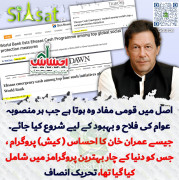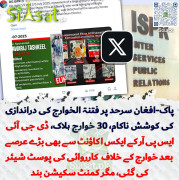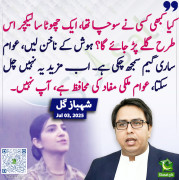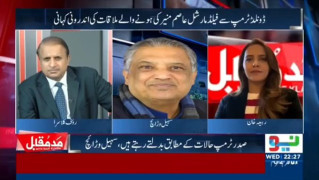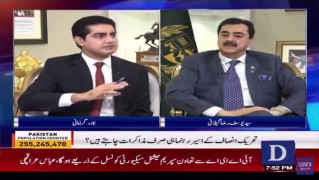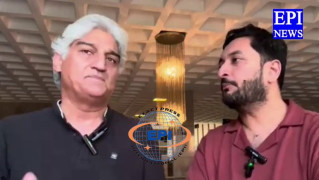Citizen X
(50k+ posts) بابائے فورم
There is a striking parallel between Sunni Islam and Roman Catholicism, one that becomes undeniable upon closer examination. Both traditions operate as vast, institutionalized systems that have layered centuries of human tradition over their respective scriptures, effectively distancing believers from the pure, unmediated word of God. Just as the Catholic Church elevates papal authority, church fathers, and extrabiblical dogma above the Bible itself, Sunni Islam exalts clerical scholarship, hadith literature, and the veneration of early Muslim figures to a near-scriptural status, often at the expense of the Quran’s clarity.
The similarities begin with their shared emphasis on intercession. Catholics teach that Jesus stands as a mediator between humanity and God, pleading on behalf of sinners on Judgment Day. Sunnis, in turn, assert that Muhammad will intercede for his followers—a concept foreign to the Quran but deeply embedded in Sunni theology. Both traditions encourage devotees to direct their reverence toward these figures in ways that border on idolatry. Catholics sing hymns to Jesus and Mary; Sunnis compose devotional poetry and prayers centered on Muhammad, even incorporating his name into their core declaration of faith. The psychological effect is the same: a subtle shift of focus from God to His messengers.
Perhaps the most haunting resemblance lies in their reliance on extrabiblical and extra-Quranic sources. The Catholic Church upholds church councils, papal decrees, and the writings of early theologians like Augustine and Aquinas as binding doctrinal authorities. Similarly, Sunni Islam treats the hadith collections—Bukhari, Muslim, and others—as indispensable to understanding Islam, despite the Quran’s insistence on its own completeness. Both groups defend these secondary sources with the same circular logic: How can you reject our traditions when the very people who preserved your scripture believed in them? To Catholics, the church fathers compiled the Bible; to Sunnis, the Sahaba (Muhammad’s companions) transmitted the Quran. In both cases, history is weaponized to legitimize theological innovations.
The structural parallels run deeper. Apostolic succession—the Catholic claim of an unbroken chain of authority from Peter to the modern pope—finds its Sunni counterpart in the isnad system, where hadith are validated through chains of narrators stretching back to Muhammad. Both systems create an illusion of unbroken tradition, reinforcing clerical authority while discouraging independent engagement with scripture. The message is clear: You cannot understand faith without our scholars. Catholics insist the Bible is too obscure without church guidance; Sunnis claim the Quran is unintelligible without hadith. Both assertions serve the same purpose: to keep believers dependent on institutional interpretation.
Even their cultural practices echo one another. Catholics recite Latin liturgies long after the language faded from common use; Sunnis ritualize Arabic prayers and phrases among non-Arabic speakers, fostering a sense of sacred exclusivity. Both traditions monetize pilgrimage—Rome, Mecca—turning spiritual journeys into lucrative enterprises. And where Catholic cathedrals are adorned with icons of saints, Sunni mosques and texts glorify the Sahaba and early caliphs in calligraphy and oral lore, elevating them to near-mythic status.
The psychological tactics are identical, too. When Protestants challenge Catholic dogma, they are met with condescension: Who are you to defy centuries of scholarship? Sunni apologists deploy the same rhetoric against Quran-centric Muslims, framing dissent as arrogance. Both systems use their historical weight to intimidate, equating tradition with truth.
Yet there is a crucial difference: the Catholic Church faced the Protestant Reformation, a movement that shattered its monopoly on scripture. Sunni Islam, however, remains largely unchallenged by a comparable reformation—until now. Those who prioritize the Quran alone are the theological heirs of Protestant reformers, rejecting clerical intermediaries to reclaim scripture’s supremacy.
In the end, Sunnism is not the pure Islam it claims to be, it is the Catholicism of the Muslim world. Both systems obscure divine scripture beneath layers of human tradition, substituting the simplicity of monotheism with the complexity of institutionalized religion. The choice, then, is the same as it was for 16th-century Christians: Will you follow the word of God, or the word of men who claim to speak for Him?
Here is a concise table in case you didn't want to read the article which I know most won't have the guts too
The similarities begin with their shared emphasis on intercession. Catholics teach that Jesus stands as a mediator between humanity and God, pleading on behalf of sinners on Judgment Day. Sunnis, in turn, assert that Muhammad will intercede for his followers—a concept foreign to the Quran but deeply embedded in Sunni theology. Both traditions encourage devotees to direct their reverence toward these figures in ways that border on idolatry. Catholics sing hymns to Jesus and Mary; Sunnis compose devotional poetry and prayers centered on Muhammad, even incorporating his name into their core declaration of faith. The psychological effect is the same: a subtle shift of focus from God to His messengers.
Perhaps the most haunting resemblance lies in their reliance on extrabiblical and extra-Quranic sources. The Catholic Church upholds church councils, papal decrees, and the writings of early theologians like Augustine and Aquinas as binding doctrinal authorities. Similarly, Sunni Islam treats the hadith collections—Bukhari, Muslim, and others—as indispensable to understanding Islam, despite the Quran’s insistence on its own completeness. Both groups defend these secondary sources with the same circular logic: How can you reject our traditions when the very people who preserved your scripture believed in them? To Catholics, the church fathers compiled the Bible; to Sunnis, the Sahaba (Muhammad’s companions) transmitted the Quran. In both cases, history is weaponized to legitimize theological innovations.
The structural parallels run deeper. Apostolic succession—the Catholic claim of an unbroken chain of authority from Peter to the modern pope—finds its Sunni counterpart in the isnad system, where hadith are validated through chains of narrators stretching back to Muhammad. Both systems create an illusion of unbroken tradition, reinforcing clerical authority while discouraging independent engagement with scripture. The message is clear: You cannot understand faith without our scholars. Catholics insist the Bible is too obscure without church guidance; Sunnis claim the Quran is unintelligible without hadith. Both assertions serve the same purpose: to keep believers dependent on institutional interpretation.
Even their cultural practices echo one another. Catholics recite Latin liturgies long after the language faded from common use; Sunnis ritualize Arabic prayers and phrases among non-Arabic speakers, fostering a sense of sacred exclusivity. Both traditions monetize pilgrimage—Rome, Mecca—turning spiritual journeys into lucrative enterprises. And where Catholic cathedrals are adorned with icons of saints, Sunni mosques and texts glorify the Sahaba and early caliphs in calligraphy and oral lore, elevating them to near-mythic status.
The psychological tactics are identical, too. When Protestants challenge Catholic dogma, they are met with condescension: Who are you to defy centuries of scholarship? Sunni apologists deploy the same rhetoric against Quran-centric Muslims, framing dissent as arrogance. Both systems use their historical weight to intimidate, equating tradition with truth.
Yet there is a crucial difference: the Catholic Church faced the Protestant Reformation, a movement that shattered its monopoly on scripture. Sunni Islam, however, remains largely unchallenged by a comparable reformation—until now. Those who prioritize the Quran alone are the theological heirs of Protestant reformers, rejecting clerical intermediaries to reclaim scripture’s supremacy.
In the end, Sunnism is not the pure Islam it claims to be, it is the Catholicism of the Muslim world. Both systems obscure divine scripture beneath layers of human tradition, substituting the simplicity of monotheism with the complexity of institutionalized religion. The choice, then, is the same as it was for 16th-century Christians: Will you follow the word of God, or the word of men who claim to speak for Him?
Here is a concise table in case you didn't want to read the article which I know most won't have the guts too
| Category | Roman Catholicism | Sunni Islam |
| Central Scripture | Bible (but often secondary to Church authority) | Quran (but often secondary to Hadith & scholarly consensus) |
| Extra-Scriptural Sources | Church dogmas, papal decrees, writings of Church Fathers (Augustine, Aquinas, etc.) | Hadith collections (Bukhari, Muslim, etc.), scholarly opinions (fatwas), tafsir |
| Intercession | Jesus and saints intercede for believers before God | Muhammad (and sometimes saints) intercede for believers on Judgment Day |
| Succession Authority | Apostolic succession (Pope as successor to Peter) | Isnad system (chain of narrators back to Muhammad) |
| Language of Ritual | Latin (historically), even if laity doesn’t understand | Arabic (required for prayer, even if non-Arabic speakers don’t fully understand) |
| Holy Sites & Pilgrimage | Vatican, Lourdes, Fatima (monetized pilgrimages) | Mecca, Medina (monetized Hajj/Umrah pilgrimages) |
| Relic Veneration | Icons, statues, and relics of saints | Calligraphy of Sahaba names, reverence for relics (e.g., Prophet’s belongings) |
| Repetitive Prayers | Rosary beads (Hail Marys, Our Fathers) | Tasbih beads (repetitive dhikr, often with Muhammad’s name) |
| Scholarly Authority | "You can’t understand the Bible without the Church!" | "You can’t understand the Quran without the scholars!" |
| Gaslighting Dissenters | "Who are you to question 2,000 years of tradition?" | "Who are you to oppose 1,400 years of scholarship?" |
| Ethnic vs. Universal | Universal (global reach, seeks converts) | Universal (global Ummah, though culturally Arab-influenced) |
| Reformation Resistance | Fought Protestant reformers (Luther, Calvin) | Opposes Quran-alone Muslims (often labeled "deviants") |

